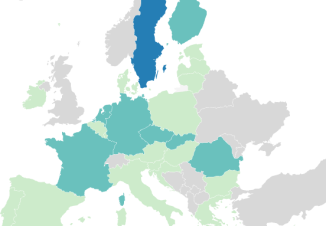
Facts
Mr Herbai, who was employed by a bank in Hungary as an HR expert started a knowledge-sharing website for HR-related publications and events. The website contained a presentation of him, with his photo, describing him as an HR expert working at the HR department of a ‘large Hungarian bank’ but without mentioning the name of the employer.
On the website two articles were published in which the authors raised questions and expressed their professional opinion on different professional matters (e.g. the effect of tax restructuring). One of the articles was written by Mr Herbai and the other one by another author. The articles did not contain any specific information regarding Mr Herbai’s employer or its HR strategies.
The bank terminated his employment relationship by ordinary dismissal on the basis that the activity described above infringed the employer’s confidentiality standards and jeopardised its economic interests.
Decision of the Hungarian courts
Upholding the judgment of the first-instance court (Budapest Labour Court) the Hungarian Supreme Court (‘Kúria’) ruled that the termination was lawful, since the applicant’s conduct could endanger his employer’s business interests.
The appeal court had overruled this and changed the ruling in favour of the employee, stating that the website dealt with HR-related topics in a general and professional manner and this kind of knowledge sharing does not result in a breach of obligation and does not mean that any of the employer’s confidential information of the employer was shared.
However Kúria, the highest court in Hungary, concluded that the information published on the website was connected with the applicant’s work duties and he had intended to share knowledge he gained at the employer; this was in breach of the bank’s code of ethics.
As a result, the applicant’s claims were definitively rejected by the Hungarian courts.
After losing the case, Mr Herbai submitted a constitutional complaint to the Hungarian Constitutional Court asking it to interpret the case from a fundamental rights perspective. The Constitutional Court stated that the content of the articles could be characterised as a professional discussion and not a public matter. This meant it was not protected by the fundamental right to freedom of expression.
We note that two judges of the Constitutional Court dissented, expressed their disagreement with the decision and saying that freedom of expression can also be interpreted in an employment context and expressing a professional opinion falls under the protection for the fundamental right to freedom of expression.
The ECHR’s decision
ECHR ruled that:
The significance of the judgment
The judgment clarified the following points for HR and employment law practice:
Further, employers must be aware that employees’ right to express their professional opinion will restrict any confidentiality obligations stipulated in employment contracts and in internal policies (such as a company code of ethics).
We believe this judgment will be a milestone in the interpretation of freedom of expression in employment context. The decision makes clear that employees can publish their professional views without any reprisals as long as they do not harm the legitimate interests of their employer or share specific confidential information related to the employer.
Herbai v Hungary, judgment No. 11608/15 of the European Court of Human Rights


